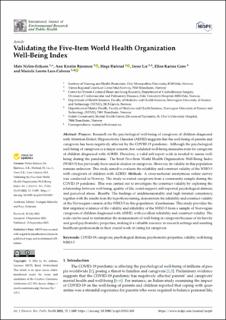| dc.contributor.author | Nylén-Eriksen, Mats | |
| dc.contributor.author | Bjørnnes, Ann Kristin | |
| dc.contributor.author | Hafstad, Hege | |
| dc.contributor.author | Lie, Irene | |
| dc.contributor.author | Grov, Ellen Karine | |
| dc.contributor.author | Lara-Cabrera, Mariela Loreto | |
| dc.date.accessioned | 2022-10-27T12:03:37Z | |
| dc.date.available | 2022-10-27T12:03:37Z | |
| dc.date.created | 2022-10-05T13:54:01Z | |
| dc.date.issued | 2022 | |
| dc.identifier.citation | International Journal of Environmental Research and Public Health (IJERPH). 2022, 19 (18), . | en_US |
| dc.identifier.issn | 1661-7827 | |
| dc.identifier.uri | https://hdl.handle.net/11250/3028652 | |
| dc.description.abstract | Purpose: Research on the psychological well-being of caregivers of children diagnosed with Attention-Deficit/Hyperactivity Disorder (ADHD) suggests that the well-being of parents and caregivers has been negatively affected by the COVID-19 pandemic. Although the psychological well-being of caregivers is a major concern, few validated well-being measures exist for caregivers of children diagnosed with ADHD. Therefore, a valid self-report scale is needed to assess well-being during the pandemic. The brief Five-Item World Health Organization Well-Being Index (WHO-5) has previously been used in studies on caregivers. However, its validity in this population remains unknown. This study aimed to evaluate the reliability and construct validity of the WHO-5 with caregivers of children with ADHD. Methods: A cross-sectional anonymous online survey was conducted in Norway. The study recruited caregivers from a community sample during the COVID-19 pandemic. This was carried out to investigate the construct validity by exploring the relationship between well-being, quality of life, social support, self-reported psychological distress, and perceived stress. Results: The findings of unidimensionality and high internal consistency, together with the results from the hypothesis testing, demonstrate the reliability and construct validity of the Norwegian version of the WHO-5 in this population. Conclusions: This study provides the first empirical evidence of the validity and reliability of the WHO-5 from a sample of Norwegian caregivers of children diagnosed with ADHD, with excellent reliability and construct validity. The scale can be used to systematize the measurement of well-being in caregivers because of its brevity and good psychometric properties, making it a valuable resource in research settings and assisting healthcare professionals in their crucial work of caring for caregivers. | en_US |
| dc.language.iso | eng | en_US |
| dc.publisher | MDPI | en_US |
| dc.rights | Navngivelse 4.0 Internasjonal | * |
| dc.rights.uri | http://creativecommons.org/licenses/by/4.0/deed.no | * |
| dc.title | Validating the Five-ItemWorld Health Organization Well-Being Index | en_US |
| dc.title.alternative | Validating the Five-ItemWorld Health Organization Well-Being Index | en_US |
| dc.type | Peer reviewed | en_US |
| dc.type | Journal article | en_US |
| dc.description.version | publishedVersion | en_US |
| dc.source.volume | 19 | en_US |
| dc.source.journal | International Journal of Environmental Research and Public Health (IJERPH) | en_US |
| dc.source.issue | 18 | en_US |
| dc.identifier.doi | https://doi.org/10.3390/ijerph191811489 | |
| dc.identifier.cristin | 2058817 | |
| cristin.ispublished | true | |
| cristin.fulltext | original | |
| cristin.qualitycode | 1 | |

